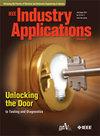Learning Volt-VAR Droop Curves to Optimally Coordinate Photovoltaic (PV) Smart Inverters
IF 4.2
2区 工程技术
Q2 ENGINEERING, ELECTRICAL & ELECTRONIC
引用次数: 0
Abstract
Learning-based solutions for power systems operational tasks are earning more consideration as potential candidates to help overcome challenges brought upon by the aggressive integration of inverter-based resources (IBRs) in active distribution networks (ADNs). Despite achieving high evaluation accuracies, machine learning (ML) methods are not yet accepted at utility-scale primarily due to safety concerns and limited interpretability. This presents an opportunity for ML approaches which can satisfy both performance and regulatory requirements. In an effort to improve these shortcomings, this work proposes a robust Deep Reinforcement Learning (DRL) based model-free adaptive volt-VAR control (VVC) dispatch framework of solar photovoltaic (PV) smart inverters (SIs) for system-wide voltage regulation and loss reduction. The framework utilizes reward shaping with a barrier function (BF) filter to embed physical boundaries for Category B-type SIs specified by the IEEE 1547-2018 standard into the constrained求助全文
约1分钟内获得全文
求助全文
来源期刊

IEEE Transactions on Industry Applications
工程技术-工程:电子与电气
CiteScore
9.90
自引率
9.10%
发文量
747
审稿时长
3.3 months
期刊介绍:
The scope of the IEEE Transactions on Industry Applications includes all scope items of the IEEE Industry Applications Society, that is, the advancement of the theory and practice of electrical and electronic engineering in the development, design, manufacture, and application of electrical systems, apparatus, devices, and controls to the processes and equipment of industry and commerce; the promotion of safe, reliable, and economic installations; industry leadership in energy conservation and environmental, health, and safety issues; the creation of voluntary engineering standards and recommended practices; and the professional development of its membership.
 求助内容:
求助内容: 应助结果提醒方式:
应助结果提醒方式:


